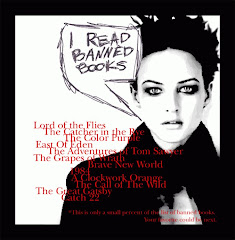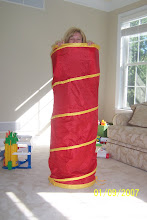Even though banned books week has come to a close, the issue of ethics in the library atmosphere is a continuing argument. I recently started posing situations in my mind as if I were the librarian. I chated with my high school's librarian about issues she has had dealing with controversial material in books. She said she could only inform me about minor details to protect the privacy of the students.
A family from another country which she didn't want to name moved to the area years ago. They did not allow their children to watch any type of television, so their children constantly read for entertainment. She said she admired how they could come after school and read from 3:00 until 5:00 without a peep. (Sounds great doesn't it! I wish more of my 10th graders read like this!). They would stay in the after school library program together and read their books and discuss them at least 2 times a week. The librarian would check in on them once in awhile, but believed their time together was valuable to each other and let them be.
It turns out that their conversations were at times about teen pregnancy. They were attempting to find any books in the school library that had to do with this subject. The parent caught on and, in short, blamed the school district and the librarian for not stopping this behavior and inappropriate conversation. She said she didn't want to disclose to me all of the details, but she said she had no idea that this is what their conversations were "always" about. The district told her to go through and pull any and all books that they had been reading and take them off the shelves. She said the parent was satisfied with this action.
The librarian was obviously upset by this action. She believed their conversations were not merely about these subjects and felt horrible about picking all of the books off of the shelves.
What would you do in this situation? Is the issue of "teen pregnancy" not allowed to be read in a high school library? Could this situation have been handled in a different way?
It is very difficult to assume the role of a teacher, information specialist, facilitator, parent, etc. in this profession and we may be faced with these decisions at one point or another. I found this website helpful in what to do if a book is challenged at your school: http://ccb.lis.uiuc.edu/challenge.html
Monday, October 13, 2008
Sunday, October 5, 2008
"But the Librarian Said I Could!"
Banned Books week may strike up controversy in the literary world. We, as librarians, believe that access should not be restricted to patrons; however, as humans, we do feel the need to protect those who cannot protect themselves. As I stated in an earlier post, most challenges are done so in the best interest of a child. In asking which other groups could challenge material, one responded with religious groups which is rightly so. In addition, racial issues is a popular challenged subject. A newer subject for challenge is on gender or sexual orientation dealing with mostly the rights of gays and lesbians (Rubin, 207). In conclusion, however, most want to protect children from potentially harmful material.
We, as librarians, are no different from society in having special concern for children. In contrast, the American Library Association's (ALA) policy called Free Access to Libraries for Minors states that library materials are not to be restricteed on the basis of the patron's age. The association "opposes libraries restricting access to library materials and services for minors and hold that it is parent - and only parents - who may restrict their children - and only their children - from access to library materials and services" (Rubin, 206).
With this information, I began thinking: How do librarians regulate/organize the issue of questionable material for children? Many questions on this topic vary depending on the type of library.
If a younger patron comes into your library wanting a book you may think is inappropriate, what do you do if the parent is not present? How would you feel as a parent if your son or daughter brought home a book you wouldn't approve of?
In a school library, how would you address this issue if a parent confronted you? Would you inform all parents at the onset of the school year about your and the school's policies?
Rubin, R. E. (2004). Foundations of library and information science (2nd ed.). New York: Neal- Schuman Publishers.
We, as librarians, are no different from society in having special concern for children. In contrast, the American Library Association's (ALA) policy called Free Access to Libraries for Minors states that library materials are not to be restricteed on the basis of the patron's age. The association "opposes libraries restricting access to library materials and services for minors and hold that it is parent - and only parents - who may restrict their children - and only their children - from access to library materials and services" (Rubin, 206).
With this information, I began thinking: How do librarians regulate/organize the issue of questionable material for children? Many questions on this topic vary depending on the type of library.
If a younger patron comes into your library wanting a book you may think is inappropriate, what do you do if the parent is not present? How would you feel as a parent if your son or daughter brought home a book you wouldn't approve of?
In a school library, how would you address this issue if a parent confronted you? Would you inform all parents at the onset of the school year about your and the school's policies?
Rubin, R. E. (2004). Foundations of library and information science (2nd ed.). New York: Neal- Schuman Publishers.
Tuesday, September 30, 2008
CHALLENGED BOOKS 2007
I looked at my school independent reading cart and recognized two of the books on this list below: "The Adventures of Huckleberry Finn" and "I Know Why a Caged Bird Sings" Are any of these books in your schools? Have they been challenged?
The ALA counted a total of 420 challenges last year. These include any formal, written statement to a school or library asking for the removal of a book. Here are the top 10, according to the ALA, for 2007:
1) “And Tango Makes Three,” by Justin Richardson/Peter Parnell
Reasons: Anti-Ethnic, Sexism, Homosexuality, Anti-Family, Religious Viewpoint, Unsuited to Age Group
2) The Chocolate War,” by Robert Cormier
Reasons: Sexually Explicit, Offensive Language, Violence
3) “Olive’s Ocean,” by Kevin Henkes
Reasons: Sexually Explicit and Offensive Language
4) “The Golden Compass,” by Philip Pullman
Reasons: Religious Viewpoint
5) “The Adventures of Huckleberry Finn,” by Mark Twain
Reasons: Racism
6) “The Color Purple,” by Alice Walker
Reasons: Homosexuality, Sexually Explicit, Offensive Language
7) "TTYL,” by Lauren Myracle
Reasons: Sexually Explicit, Offensive Language, Unsuited to Age Group
8) "I Know Why the Caged Bird Sings,” by Maya Angelou
Reasons: Sexually Explicit
9) “It’s Perfectly Normal,” by Robie Harris
Reasons: Sex Education, Sexually Explicit
10) "The Perks of Being A Wallflower,” by Stephen Chbosky
Reasons: Homosexuality, Sexually Explicit, Offensive Language, Unsuited to Age Group
"Frequently Challenged Books," American Library Association, July 29, 2008. http://www.ala.org/ala/aboutala/offices/oif/bannedbooksweek/challengedbanned/frequentlychallengedbooks.cfm
(Accessed September 30, 2008)
The ALA counted a total of 420 challenges last year. These include any formal, written statement to a school or library asking for the removal of a book. Here are the top 10, according to the ALA, for 2007:
1) “And Tango Makes Three,” by Justin Richardson/Peter Parnell
Reasons: Anti-Ethnic, Sexism, Homosexuality, Anti-Family, Religious Viewpoint, Unsuited to Age Group
2) The Chocolate War,” by Robert Cormier
Reasons: Sexually Explicit, Offensive Language, Violence
3) “Olive’s Ocean,” by Kevin Henkes
Reasons: Sexually Explicit and Offensive Language
4) “The Golden Compass,” by Philip Pullman
Reasons: Religious Viewpoint
5) “The Adventures of Huckleberry Finn,” by Mark Twain
Reasons: Racism
6) “The Color Purple,” by Alice Walker
Reasons: Homosexuality, Sexually Explicit, Offensive Language
7) "TTYL,” by Lauren Myracle
Reasons: Sexually Explicit, Offensive Language, Unsuited to Age Group
8) "I Know Why the Caged Bird Sings,” by Maya Angelou
Reasons: Sexually Explicit
9) “It’s Perfectly Normal,” by Robie Harris
Reasons: Sex Education, Sexually Explicit
10) "The Perks of Being A Wallflower,” by Stephen Chbosky
Reasons: Homosexuality, Sexually Explicit, Offensive Language, Unsuited to Age Group
"Frequently Challenged Books," American Library Association, July 29, 2008. http://www.ala.org/ala/aboutala/offices/oif/bannedbooksweek/challengedbanned/frequentlychallengedbooks.cfm
(Accessed September 30, 2008)
QUESTION FOR YOU!
Most challenged and/or banned books are treated as such because of the bests interests of children. Can you think of any other group that would need to be protected from books? Why?
ALA Banned Books Week
In light of this special time of year, I decided to do a blog on banned books! Below is some general information about this years Banned Books Week from the American Library Associations. MORE TO COME SOON!
Banned Books Week: Celebrating the Freedom to Read September 27–October 4, 2008
Banned Books Week: Celebrating the Freedom to Read is observed during the last week of September each year. Observed since 1982, this annual ALA event reminds Americans not to take this precious democratic freedom for granted. This year, 2008, marks BBW's 27th anniversary (September 27 through October 4).
BBW celebrates the freedom to choose or the freedom to express one’s opinion even if that opinion might be considered unorthodox or unpopular and stresses the importance of ensuring the availability of those unorthodox or unpopular viewpoints to all who wish to read them. After all, intellectual freedom can exist only where these two essential conditions are met.
BBW is sponsored by the American Booksellers Association, American Booksellers Foundation for Free Expression, American Library Association, American Society of Journalists and Authors, Association of American Publishers, National Association of College Stores, and is endorsed by the Center for the Book in the Library of Congress.
"Banned Books Week," American Library Association, July 29, 2008. http://www.ala.org/ala/aboutala/offices/oif/bannedbooksweek/bannedbooksweek.cf
(Accessed September 30, 2008)
Banned Books Week: Celebrating the Freedom to Read September 27–October 4, 2008
Banned Books Week: Celebrating the Freedom to Read is observed during the last week of September each year. Observed since 1982, this annual ALA event reminds Americans not to take this precious democratic freedom for granted. This year, 2008, marks BBW's 27th anniversary (September 27 through October 4).
BBW celebrates the freedom to choose or the freedom to express one’s opinion even if that opinion might be considered unorthodox or unpopular and stresses the importance of ensuring the availability of those unorthodox or unpopular viewpoints to all who wish to read them. After all, intellectual freedom can exist only where these two essential conditions are met.
BBW is sponsored by the American Booksellers Association, American Booksellers Foundation for Free Expression, American Library Association, American Society of Journalists and Authors, Association of American Publishers, National Association of College Stores, and is endorsed by the Center for the Book in the Library of Congress.
"Banned Books Week," American Library Association, July 29, 2008. http://www.ala.org/ala/aboutala/offices/oif/bannedbooksweek/bannedbooksweek.cf
(Accessed September 30, 2008)
Subscribe to:
Comments (Atom)

